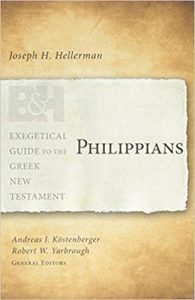The Exegetical Guide to the Greek New Testament (EGGNT) is part commentary and part Greek study resource. The EGGNT series includes information found in Greek lexical and grammatical tools.

Like other commentaries, authors provide an introduction to each book and conclude their analysis of each passage with suggestions for applications, which surely help pastors and others in ministry.
Authors also provide lists of recommended resources, so readers can build off the Greek insights they glean from EGGNT volumes to learn more about the history, genre, and theology of the biblical text.
Which commentary series is best for your purposes? See Best Bible Commentaries: Top 50. Based on aggregate reviews.
Promotional video: Joseph Hellerman on the Philippians volume
Exegetical Guide to the Greek New Testament (EGGNT): Reviews
On the Ephesians volume:
“Ephesians is a theologically rich, spiritually refreshing text, but its Greek is often ambiguous and difficult. Ben Merkle’s exegetical guide provides a concise, clear explanation of the Greek with helpful suggestions for preaching the text.
This will be a useful volume to any minister of the gospel who values straightforward, expositional preaching and is preparing a sermon on this important part of God’s Word.”
~ Frank Thielman, Professor of New Testament, Beeson Divinity School
“Ben Merkle’s commentary on Ephesians should be on the shelf of everyone who studies the Greek text of Ephesians. Three things stand out in this commentary.
First, the structure of the text is nicely portrayed so that readers can see the flow of the argument. These structural layouts alone are worth the price of the book.
Second, the book concisely and clearly sets forth the various grammatical options. Merkle fairly and wisely adjudicates among the various options.
Third, Merkle’s commentary on the text captures well the theology in one of Paul’s most important letters.”
~ Thomas R. Schreiner, Professor of New Testament Interpretation, Southern Baptist Theological Seminary
Authors Interviews from the EGGNT series on Best Bible Commentaries
Luke – Alan Thompson: (click to read entire Q & A)
Preview: “I was reminded again and again of the authority and compassion of Jesus (note e.g., references in the EGGNT Luke volume to the power of Jesus’ word in 4:14–6:49; 7:1–8:56; and the use of κύριος in Luke’s Gospel).
I was also reminded of the number of times Luke’s Gospel draws attention to the impact that eternity, what lies beyond the grave, and the judgment to come should have on our lives now.”
Romans – John Harvey: (click to read entire Q & A)
Working through the text in detail and at length was an enriching experience, especially seeing the way in which Paul “unpacks” the richness of the gospel that is “God’s power for salvation to everyone who believes” (1:16).
More interviews:
Ephesians – Ben Merkle (click to read entire Q & A)
Matthew – Charles Quarles (click to read entire Q & A)
Purpose of the Exegetical Guide to the Greek New Testament Series
The Exegetical Guide to the Greek New Testament (EGGNT) closes the gap between the Greek text and the available lexical and grammatical tools, providing all the necessary information for greater understanding of the text.
The series makes interpreting any given New Testament book easier, especially for those who are hard pressed for time but want to preach or teach with accuracy and authority.
Each volume begins with a brief introduction to the particular New Testament book, a basic outline, and a list of recommended commentaries.
The body is devoted to paragraph-by-paragraph exegesis of the Greek text and includes homiletical helps and suggestions for further study. A comprehensive exegetical outline of the New Testament book completes each EGGNT volume.
Volumes in the EGGNT Commentary Series
The links below go to Amazon, which sells new and used books. Also visit Christian Book Distributors‘ EGGNT commentaries page to compare prices.
“Quarles continues to distinguish himself as one of today’s leading Matthean scholars with this commentary. Unlike the other volumes in the EGGNT series thus far, this is not a survey of the best of previous commentators with assessment of interpretive debates, but a full-fledged grammatical and discourse analysis of Matthew itself.
Quarles blends the best of the classic Mounce/Wallace approach with the best of the newer Levinson/Runge approach to create a work like the Baylor Handbook on the Greek New Testament on steroids. A wonderful gift to both the academy and the church.”
~ Craig L. Blomberg, Distinguished Professor of New Testament, Denver Seminary
“In line with the vision of Murray J. Harris, who originated the EGGNT series, Alan Thompson’s fine volume on Luke succinctly provides judicious explanation of the Greek syntax, structure, grammatical options, the flow of the argument, and more.
This volume will be a gold mine for students and pastors alike who are keeping up their Greek while studying this Gospel closely. Highly recommended.”
~ D. A. Carson, research professor of New Testament, Trinity Evangelical Divinity School
Murray J. Harris is professor emeritus of New Testament Exegesis and Theology at Trinity Evangelical Divinity School in Deerfield, Illinois, and former warden of Tyndale House in Cambridge, England. He presently resides in New Zealand.
“This volume, by a trustworthy and immensely careful scholar, is an essential addition to the desk of any serious biblical scholar or student.”
~ Ann Jervis, Professor of New Testament, Wycliffe College
Ephesians – Benjamin L. Merkle
“Ben Merkle’s commentary on Ephesians should be on the shelf of everyone who studies the Greek text of Ephesians. Three things stand out in this commentary.
First, the structure of the text is nicely portrayed so that readers can see the flow of the argument. These structural layouts alone are worth the price of the book.
Second, the book concisely and clearly sets forth the various grammatical options. Merkle fairly and wisely adjudicates among the various options.
Third, Merkle’s commentary on the text captures well the theology in one of Paul’s most important letters.”
~ Thomas R. Schreiner, Southern Baptist Theological Seminary
Philippians – Joseph H. Hellerman
Joseph H. Hellerman (Ph.D., University of California, Los Angeles) is professor of New Testament Language and Literature at Talbot School of Theology, Biola University, La Mirada, California.
Colossians and Philemon – Murray J. Harris
Murray J. Harris is professor emeritus of New Testament Exegesis and Theology at Trinity Evangelical Divinity School in Deerfield, Illinois, and former warden of Tyndale House in Cambridge, England. He presently resides in New Zealand.
Greg W. Forbes (Ph.D., Deakin University, Melbourne) is head of the Department of Biblical Studies at Melbourne School of Theology in Australia.
Chris Vlachos is Ph.D. program administrator and adjunct assistant professor of New Testament at Wheaton College. He served twenty-two years as an instructor and professor of Greek and New Testament at Salt Lake Theological Seminary.
Vlachos is also the author of The Law and the Knowledge of Good and Evil: The Edenic Background of the Catalytic Operation of the Law in Paul (Wipf & Stock) and (with Marvin R. Wilson) A Workbook for New Testament Greek: Grammar and Exegesis in First John (Hendrickson).
Dana M. Harris serves as associate professor of New Testament at Trinity Evangelical Divinity School.

